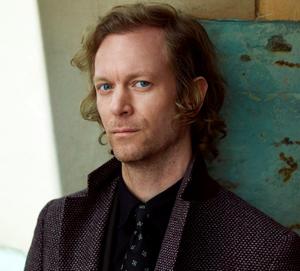 |
|
| photo: Gabriel Liljevall | |
Niklas Natt och Dag is a member of Sweden's oldest existing noble family. The Wolf and the Watchman, coming March 5, 2019, from Atria, is his first novel. This fascinating, suspenseful "historical noir" is set in 1793 Sweden and steeped in the philosophy of the Enlightenment. The novel was named Best Debut of 2017 by the Swedish Academy of Crime Writers. Natt och Dag lives in Stockholm with his wife and their two sons.
How did you create such an authentic 18th-century world?
Through an immense amount of reading, which I thoroughly enjoyed. My research became the reading adventure of a lifetime.
Have books always played a significant role in your life?
I've always been an omnivore as a reader. I was a lonely child, and I turned to reading for company. There was magic there: suddenly you would find yourself in a very intimate relationship with someone distant or deceased, someone with whom you had nothing more in common than the fact that the words he or she had written came alive in your head.
Any specific books you remember from childhood?
I was in awe of the biggest book my parents had on their bookshelves--Shōgun by James Clavell. I eventually got around to reading it and loved it unconditionally. Also, when I was around 10 years old, my mother and I visited a family friend in San Francisco. There, I met a man who'd sailed America's Cup three times. He was a real man's man--an elderly gentleman who looked like Clint Eastwood. He gave me the first three books of Patrick O'Brian's Aubrey/Maturin cycle, about the British Royal Navy during the Napoleonic Wars. It was a great gift. I loved those books, all 20½ of them.
And all this led to a writing career?
I felt that being an author was the greatest thing one could aspire to be. It was my dream early on, but I waited a long time. I became a journalist, and found a creative outlet that way for about 15 years. All things considered, I'm glad I waited to become an author. It took me a long time to get ready, and I needed the practice.
You tell your story through various points of view and a reverse chronology.
I'm part of a generation that was raised on movies by Quentin Tarantino, so reverse chronology and such plot devices always seemed quite natural to me. But the decision to write the novel the way I did came about because of a book called Cloud Atlas by David Mitchell. Written like a palindrome, it's riveting--six stories in all--and the way it gets told makes remarkable points on cause and effect.
So Cloud Atlas was the structural inspiration?
Yes. But my main inspiration for The Wolf and the Watchman was Umberto Eco's The Name of the Rose.
You're a direct descendant of Sweden's oldest noble family.
My family sat on one of the greatest fortunes in Swedish history--blood money from the Thirty Years War--until about 1690, when one single ancestor of mine lost all of it. He married many times, gambled, indebted himself at interest, was very unfortunate and also fell victim to what is described as the main hereditary attribute of the Natt och Dag clan: an indomitable will not to bow to others, even though standing your ground will result in personal catastrophe. For the next 200 years, we survived as any poor noble family would, as career army officers. My relatives took part in the Swedish war on Russia that provides a backdrop to The Wolf and the Watchman.
The book paints a very dark picture of 1793 Stockholm. Did you find any similarities to the world today?
When I started reading diaries and accounts written by the people who experienced the late 18th century, I found much in common to today. Apart from the obvious differences in culture and beliefs, the day-to-day distractions are exactly the same: Who's in love with me? Why am I not as appreciated as I should be? What must I do to further myself? That was initially a comfort to me, because it made things easy to relate to. However, the more I thought about it, the more depressed it made me. We've achieved enormous advances technically during the last few centuries, without evolving at all as social animals. I fear that spells disaster. I believe I'm quoting Harold Bloom--who may be quoting someone else--when I say that the world doesn't get better or worse, it just gets older.
How has society changed since 1793?
It's changed to the better for many of us, but I don't think human nature has changed. It is our sad lot to be predators to one another. History will break your heart telling you so.
And good and evil?
I don't believe in good and evil. I believe there are good acts and evil acts, and we're all capable of them. Evil only gets scary when it can be rationally explained, because that allows you to glimpse the seed of it within yourself. True horror to me springs from the fact that we as a species, humanity, is the true villain in every story.
Your novel will be published in 30 countries. Are you surprised by the reception?
Very. I did not write a novel set in Stockholm 1793 thinking it would ever interest anyone outside of Sweden (or inside, for that matter).
Will you return to 1793 Sweden in another book?
The Wolf and the Watchman is actually the start of a trilogy, chronicling the three full years of the interim regency, so my life will be all about the late 18th-century until the final volume sees publication in 2021. --Kathleen Gerard

